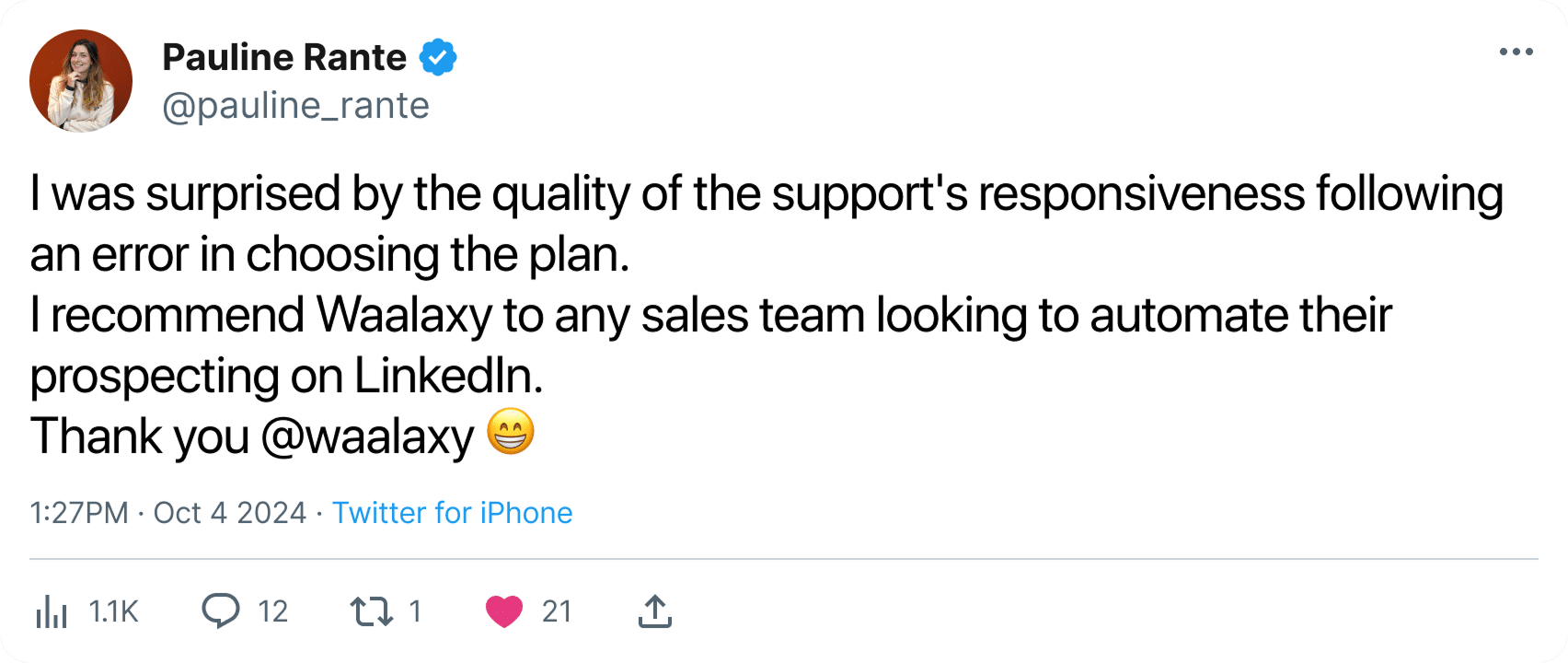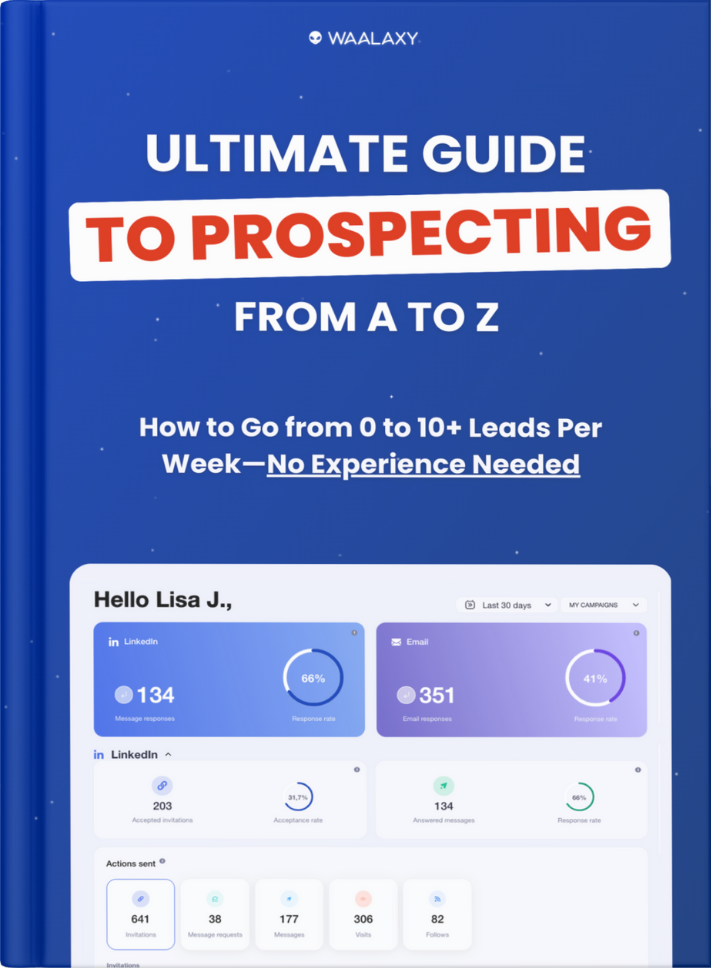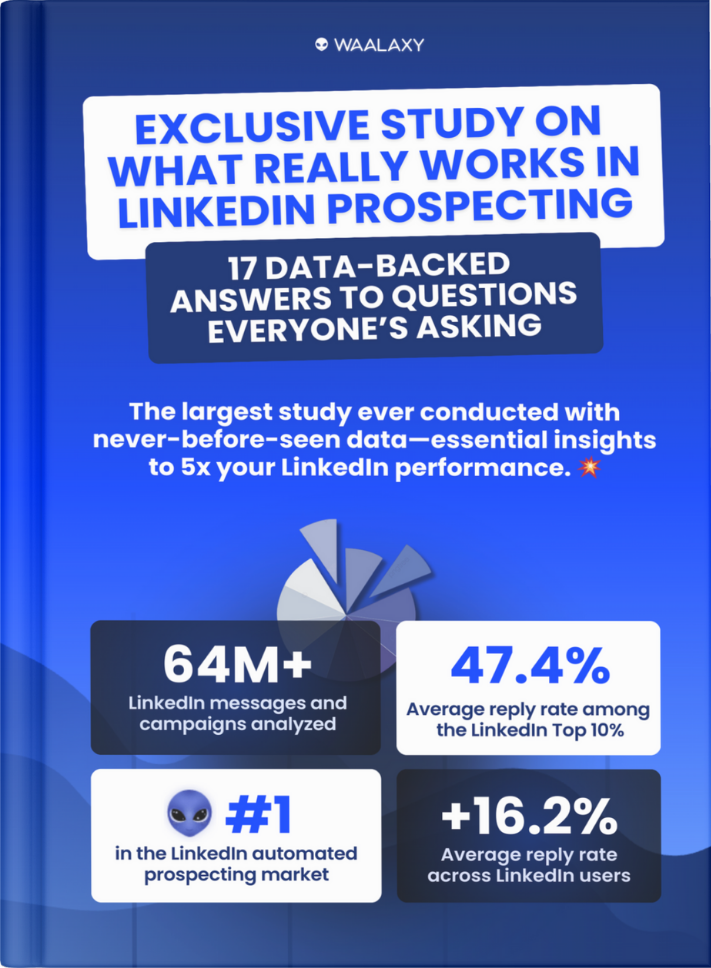What is marketing? Anglicism. Masculine noun (Marketing) – A simple definition of marketing and the main detailed approaches…
What is marketing? A simple definition
Definition of marketing – From the root “Market”.
Marketing refers to the strategies used to design and promote products and services based on an analysis of consumer needs in a specific market.
Marketing appears at every stage of the sales process:
- 🎯 Upstream, to define the sales offer, the target(s) and by what means of communication, reach your buyer persona.
- 📢 During the sales process, by setting up marketing campaigns: advertising, events, emailings.
- 📶 Downstream, to analyze the results of a marketing campaign and take new strategic measures.
Marketing is at the heart of a company’s strategy for launching, boosting and sustaining its business over time. So it’s essential to choose the right approach!
What are the different approaches to marketing?
First of all, what is the definition of “marketing approach“? 🤔
An “approach” is a way of gaining access to a prospect in order to convey a message.
The aim of the approach is to arouse the consumer’s interest in order to trigger a desire to buy.
Marketing approaches therefore designate the manner and set of actions a company chooses to contact, attract and promote its products or services. 📣
They will vary according to your strategy and objectives, and will therefore change over time. Several approaches can be used simultaneously.
22 different types of marketing explained
Let’s discover the 22 types of marketing. 👇🏼
1) Strategic marketing
This type of marketing uses the right tools to capture market trends and allows you to lay out a solid strategy that will propel your business ahead of the competition over the long term. 🚀
Objectives :
- Anticipate market trends.
- Identify opportunities.
- Steer actions to achieve sustainable growth.
How :
- SWOT.
- 5 proter forces.
- Pestel.
- Identity lens.
- BCG matrix.
- Positioning
2) Operational marketing
Here, we’re talking about all the concrete actions and missions to be carried out (defined during the marketing analysis). 🔎
Objectives :
- Promote products/services.
- Generate sales.
- Achieve set objectives.
How :
- Email campaigns / prospecting.
- Data scrapping.
- Competitions.
- Promotions.
3) Relationship marketing
These are marketing actions designed to maintain lasting relationships with customers. 😇
Objectives :
- Accompany customers on their journey to a privileged experience.
- Create buying habits.
- Customer satisfaction and loyalty.
How :
- Events.
- Series of e-mails.
- Flash offers.
- Participation in the creation of new products.
- Loyalty card.
4) Transactional marketing
Here, we’re talking about marketing operations that encourage the act of buying from a brand-new customer. 👀
Objectives :
- Focused on immediate sales.
- Increased sales volume.
How :
- Promotions.
- Discounts.
- Flash sale.
- Suggested purchase.
- Simplified route on the website.
5) Promotional marketing
We’re going to focus on actions to stimulate purchases through temporary offers. ⏰
Objectives :
- Attract new customers.
- Boost your company’s reputation and popularity.
How :
- Discounts.
- Competition.
- Free samples.
On the following channels:
- Google Ads.
- TV / radio.
- Advertising posters.
- Web banners.
6) Digital marketing
Digital marketing is the art of promoting online offers and reaching targets via digital channels.
The objective? Boost visibility, attract and engage an audience to generate conversions and boost brand awareness. 🚀
Marketing channels :
- Social networking.
- SEO.
- SEA.
- Online advertising.
- Emailing & newsletters.
- Content marketing.
- Sponsorship.
7) Outbound marketing
Here, we take a proactive approach to capturing the attention of potential customers through external channels. The idea is to get prospects where they are! 🎯
Objectives :
- Grab the customer’s attention quickly.
- Active prospecting.
How :
- TV and radio advertising.
- Billboard advertising.
- Cold emailing.
8) Inbound marketing
Rather than fetching customers, we make them come naturally by offering them relevant and useful content. A strategy that focuses on added value 😉
Objectives :
- Attract and engage a targeted audience.
- Develop a relationship of trust.
How :
- Blogs and SEO articles.
- Ebooks and white papers.
- Videos and tutorials.
9) Social media marketing
Social networks are the ideal playground for promoting your products, interacting with your customers and creating a real community. 💬
Objectives :
- Commitment and loyalty.
- Create a close relationship with your audience.
How :
- Publications on Facebook, Instagram, LinkedIn, X, TikTok…
- Management tools like Hootsuite or Buffer.
10) SEM (Search Engine Marketing)
Here, we’re talking about using paid advertising to maximize visibility on search engines. Ideal for boosting traffic fast! 🔍
Objectives :
- Increase the number of qualified visitors.
- Optimize return on investment.
How :
- Google Ads
- Bing Ads
11) Mobile (or smartphone) marketing
With our smartphones always at hand, brands need to adapt and imagine new ways of interacting with their audiences on the move. 📱
Objectives :
- Target mobile users.
- Personalize customer relations.
How :
- SMS marketing and push notifications.
- Geolocation.
- Mobile applications.
12) Content marketing
Creating useful and engaging content to capture consumers’ attention is the basis of content marketing. 🎨
Objectives :
- Inform and retain your audience.
- Reinforce brand awareness.
How :
- Blog posts.
- Podcasts, videos and infographics.
- Newsletters.
13) Influence marketing
Influencers have become key players in marketing. Collaborating with them means ensuring authentic, targeted visibility. ✨
Objectives :
- Increase brand awareness.
- Reach specific audiences.
How :
- Partnerships with influencers.
- Sponsored publications.
- Product co-creation.
14) Affiliate marketing
The idea is simple: pay partners to promote a product or service, and thus generate more sales. 💰
Objectives :
- Increase sales through external partners.
- Generate new leads.
How :
- Affiliation platforms.
- Tracked links.
- Ambassador programs.
15) Direct marketing
Sometimes it’s better to get straight to the point and talk directly to the customer. Direct marketing is the art of eliciting an immediate response! ⚡
Objectives :
- Communicate individually with the customer.
- Generate a rapid response.
How :
- Emailing and SMS.
- Phone calls.
- Postal mail.
16) Social marketing
It’s possible to combine business and social commitment! This type of marketing aims to promote causes to improve brand image. 🌍
Objectives :
- Promote the company’s commitment.
- Improve brand perception.
How :
- Social responsibility campaigns.
17) Brand marketing (or branding)
Building a strong brand image is essential to stand out from the crowd and make a lasting impression. 🔥
Objectives :
- Develop and reinforce brand perception.
- Create a unique identity.
How :
- Logos and slogans.
- Notoriety advertising.
18) International marketing
When a brand wants to expand internationally, it needs to adapt its strategy for each geographic market. 🌍
Objectives :
- Conquer new markets.
- Adapt your communication to each culture.
How :
- Locating products and services.
19) Experiential marketing
Giving consumers a memorable experience is the lifeblood of experiential marketing. 🎭
Objectives :
- Create an emotional bond with the brand.
- Offer an immersive experience.
How :
- In-store events.
- Pop-up stores.
20) Sensorial marketing
Our senses play a key role in the act of buying. This type of marketing exploits its impact on the customer experience. 🎶
The aim? Stimulate the senses to influence purchasing decisions.
How :
- In-store music.
- Odor diffusion.
- Sensory design.
21) Neuromarketing
By studying the brain’s reactions to marketing stimuli, we can fine-tune our strategies to maximize their impact. 🧠
The aim? To understand and influence buying behavior.
How :
- Eye-tracking.
- EEG studies.
- Emotional analysis.
22) Omnichannel marketing
Integrating multiple channels for a seamless, fluid experience is what omnichannel marketing is all about. 🔄
Objective: Ensure continuity between all points of contact.
How :
- Online and in-store strategy.
- Customer follow-up on several platforms.
🤷🏻♀️ Of course, there are other derivatives such as green marketing, sustainable marketing, product marketing, video marketing and so on.
We’ve given some quick definitions, but we can give you more information on the difference between strategic and operational marketing.
Conclusion – What is marketing?
🏁 And there you have it, you can now answer the question “What is marketing?”, and you can even name most of the types of marketing that exist.
- Definition,
- Objectives,
- Acquisition channels,
- Marketing tools…
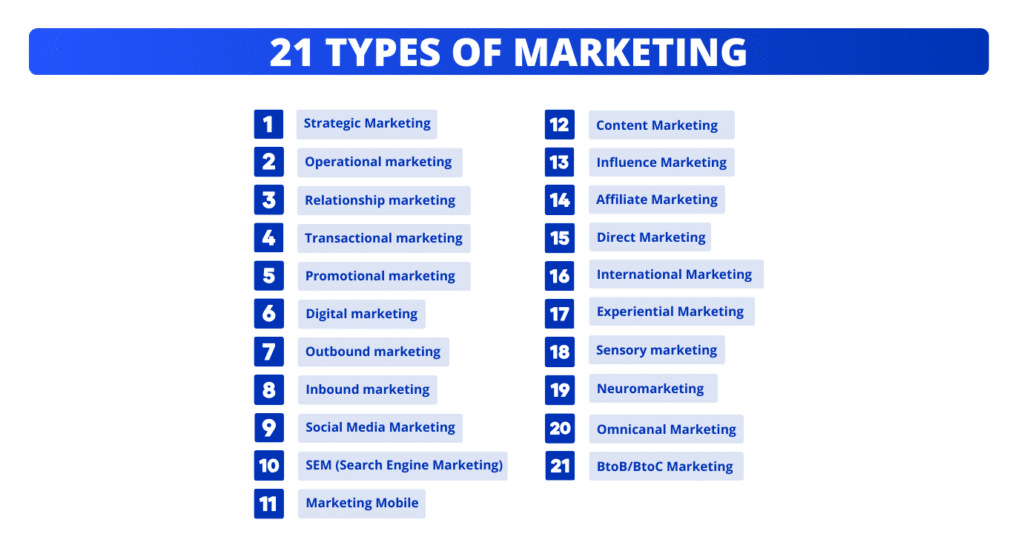
🧱 Now you can start building your own marketing strategy. And, when it’s done, launch multi-channel actions (LinkedIn + Email) with Waalaxy! 👽
Coming up in our FAQ 🚨: marketing professions (with salaries and studies to get there) and the different principles of marketing!
Frequently Asked Questions (FAQ)
What is marketing: marketing professions, salaries, studies?
Marketing encompasses several hundred professions (fields and specializations). 🤯
Of course, we can’t list all marketing specialists, but here are the main marketing professions, with their main mission and a salary range 👇🏼 :
| Business | Description | Estimated annual salary (€) |
|---|---|---|
| Marketing Manager | Manage a company’s global marketing strategy. Identify the best campaigns and channels for your offer. | 50,000 – 90,000 € |
| Product Manager | Manage the development and promotion of sales or a specific product. Launch projects. Define offer and persona. | 40,000 – 70,000 € |
| Marketing project manager | Coordinate and implement marketing projects. | 35,000 – 55,000 € |
| Marketing manager | Execute all operational marketing actions. | 30,000 – 45,000 € |
| Communications Manager | Choose the best channels to contact and wait for the target. Oversee the company’s internal and external communications. | 45,000 – 80,000 € |
| Digital marketing manager | Develop and manage online marketing strategies. | 50,000 – 85,000 € |
| Community manager | Animate and manage the brand’s presence on social networks. | 25,000 – 35,000 € |
| Social media manager | Develop the brand’s global social networking strategy. Execute marketing actions and launch campaigns. | 35,000 – 55,000 € |
| Content manager | Design and oversee content creation to attract and engage audiences. | 35,000 – 60,000 € |
| SEO/SEM manager | Optimize natural and paid search to increase visibility on search engines. | 40,000 – 70,000 € |
| Growth hacker | Implement strategies for rapid, measurable growth. | 40,000 – 70,000 € |
| Data analyst marketing | Verify results, analyze and interpret data to inform marketing decisions. | 35,000 – 65,000 € |
| Traffic manager | Manage traffic acquisition on various digital channels. | 40,000 – 60,000 € |
| CRM manager | Optimize customer relations and manage loyalty campaigns. | 45,000 – 75,000 € |
| Email marketing manager | Design and implement email campaigns to achieve conversion and loyalty objectives. | 35,000 – 55,000 € |
| Brand manager | 360° vision of all corporate communications. Ensurebrand image management and consistency. Adapt the company’s storytelling. | 45,000 – 75,000 € |
| Media planner | Plan advertising campaigns on various media. | 30,000 – 50,000 € |
| Web marketing manager | Coordinate web-specific marketing activities (SEO, affiliation, etc.). | 40,000 – 65,000 € |
| UX/UI designer | Work on optimizing the user experience on digital interfaces. | 35,000 – 60,000 € |
| Marketing Research Manager | Conduct research to understand trends, dominant behaviors and competitors(benchmarking). | 35,000 – 55,000 € |
Advertised values may vary according to experience, company size, geographical location…
Job titles and missions may also vary according to the organization you work for, the size of the structure, the sector of activity, the types of marketing actions…
To understand the main missions, it’s best to look at marketing job offers on job boards. 🧠
Would you like to work in one of the above marketing professions? 📚 Generally, the studies to follow are:
- Classic” curriculum 🎻: enter a business school for a bac+5, i.e. up to Mastère (private school) or Master Marketing (public school).
- Less classique⚡️: start by finding a job as a marketing assistant without having gone through the classic curriculum and develop your skills and know-how (for example, with online training courses).
However, it usually takes at least 5 years’ experience to reach management positions. ⏳
Of course, once again, it all depends on your skills and past professional successes, as well as the organization hiring you.
Marketing principles: what is the marketing mix?
🌟 Marketing principles (or marketing mix) aim to define a company’s marketing positioning in a market and differentiate itself from the competition.
First, there were 4 of them. 👇🏼
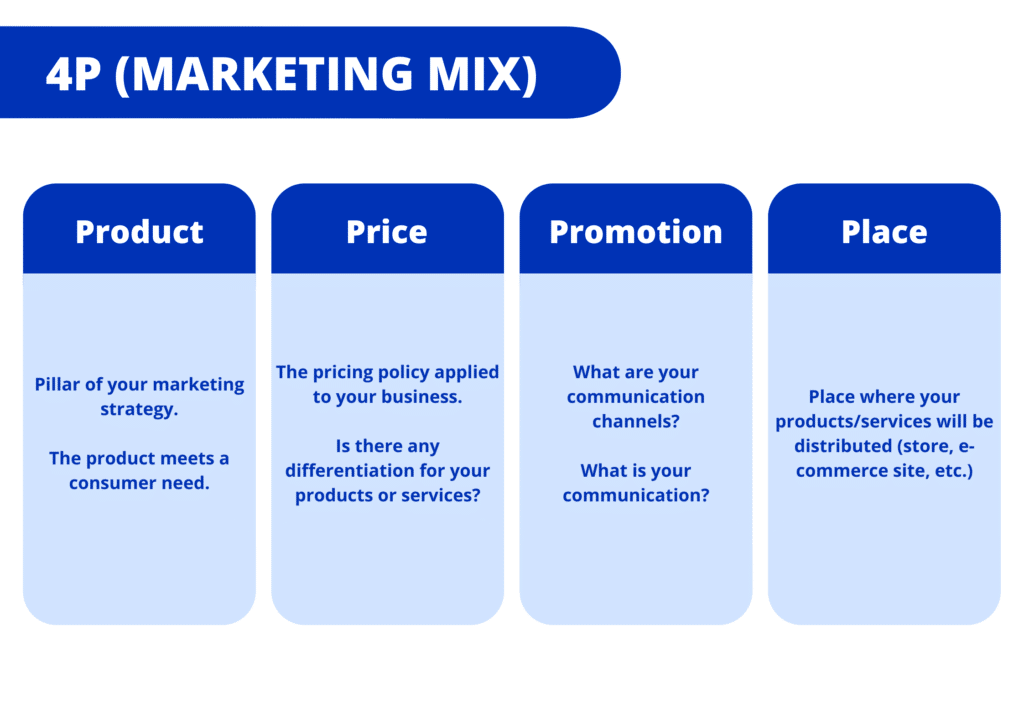
Then they became 7. 👇🏼
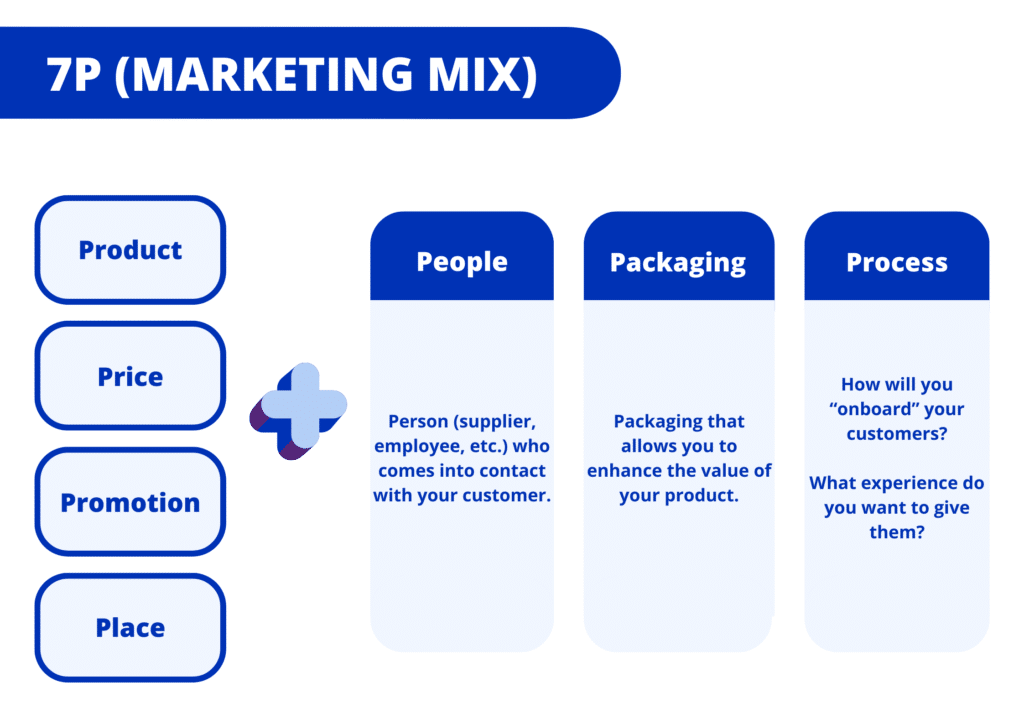
So now you know“what marketing is” and the different approaches you can use to develop your business. See you soon! 👽


